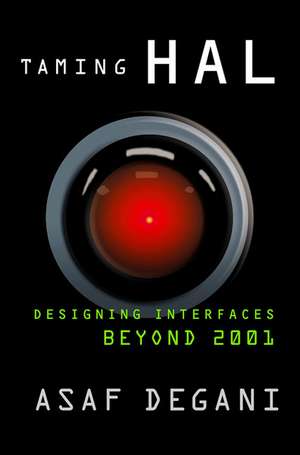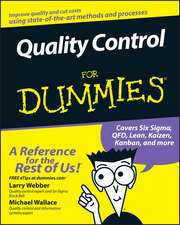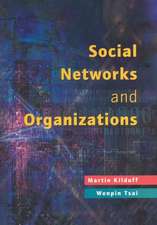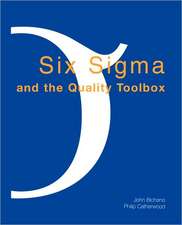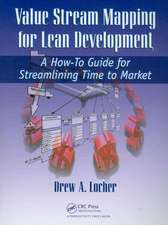Taming HAL: Designing Interfaces Beyond 2001
Autor A. Deganien Limba Engleză Hardback – 12 feb 2004
| Toate formatele și edițiile | Preț | Express |
|---|---|---|
| Paperback (1) | 382.79 lei 6-8 săpt. | |
| Palgrave Macmillan US – 25 dec 2015 | 382.79 lei 6-8 săpt. | |
| Hardback (1) | 389.24 lei 6-8 săpt. | |
| Palgrave Macmillan US – 12 feb 2004 | 389.24 lei 6-8 săpt. |
Preț: 389.24 lei
Nou
Puncte Express: 584
Preț estimativ în valută:
74.52€ • 77.46$ • 61.78£
74.52€ • 77.46$ • 61.78£
Carte tipărită la comandă
Livrare economică 06-20 februarie 25
Preluare comenzi: 021 569.72.76
Specificații
ISBN-13: 9780312295745
ISBN-10: 031229574X
Pagini: 312
Ilustrații: VIII, 312 p.
Dimensiuni: 152 x 229 x 28 mm
Greutate: 0.6 kg
Ediția:2003
Editura: Palgrave Macmillan US
Colecția Palgrave Macmillan
Locul publicării:New York, United States
ISBN-10: 031229574X
Pagini: 312
Ilustrații: VIII, 312 p.
Dimensiuni: 152 x 229 x 28 mm
Greutate: 0.6 kg
Ediția:2003
Editura: Palgrave Macmillan US
Colecția Palgrave Macmillan
Locul publicării:New York, United States
Cuprins
PART 1: FROM THE BEGINNING Introduction Let's Start The End of the Beginning On Non-Determinism, Golems, Fear, and the Case of the Night Alarm Korean Airlines Flight 007 and Non-Determinism PART 2: MODELS OF DEVICES, INTERNET, AND CONTROL SYSTEMS The Statecharts Way Models of Everyday Things Surfing and Analyzing Internet Sites Automated Control Systems The Crash of an Airbus A-320 in Strasbourg, France, and Mode-Mode Interaction Guidelines for Design PART 3: BACK TO FORMAL Formal Aspects of Human-Automation Interaction Human-Automation Interaction: The Case of a New Autopilot A New Flight Management Function: The Complete Evaluation Process Conclusion
Recenzii
"An entertaining and thought-provoking text on problems with many existing machine interfaces, from simple lamps to complex aircraft displays. Using the dangerous malfunction of the computer HAL from 2001: A Space Odyssey as a stepping-off point, Degani clearly delineates the differences between machine and human models of tasks and processes, points out where communication disconnects can occur, and describes design solutions to prevent such errors...of interest to educated lay readers as well as engineers and aviators." - Library Journal
"Asaf Degani is one of the leading experts on the impact of computer automation on human beings. In Taming Hal, he has written a book that is full of clear and cogent examples that show why automation can frequently bewilder, frustrate, and sometimes even harm us - from the frustrations caused by VCRs to the tragic shooting down of 269 people on Korean Airlines 007. Even more importantly, he provides solutions by showing how automation could be designed to serve our human needs and capabilities, thereby improving the quality of all of our lives." - Kim J. Vicente, Professor of Mechanical & Industrial Engineering, University of Toronto, and author of The Human Factor: Revolutionizing the Way People Live With Technology
"Automation is no longer an esoteric buzzword for the scientific community, but is now a common attribute of most everyday products and environments. This book provides a riveting account of how automation influences our daily lives and demonstrates why some automated systems produce undesirable human experiences, from minor inconveniences to human tragedy. Degani has produced the most comprehensive automation resource to date, and has masterfully afforded casual readers, students, and professional automation researchers and designers alike with a new found ability to understand, model and solve automation design problems." - Dr. Anthony D. Andre, Founding Principal of Interface Analysis Associates and Adjunct Professor of Human Factors/Ergonomics, San Jose State University
"Degani makes a number of critical points about human-system interface
design, and does it with a light, easy-to-read manner with
compelling examples." - Thomas B. Sheridan, Emeritus Professor of Mechanical Engineering and Aeronautics and Astronautics at the Massachusetts Institute of Technology (MIT)
"Degani has a wonderful knack for making complex topics simple. This book is a wonderful start for all those who wish to understand the complexities of everyday technology. Along the way, we finally understand how a Korean airliner could have strayed so much that the Soviets shot it down, thinking it a spy plane, how an over-intelligent navigation system led a cruise ship to run aground, and even why the alarm clock so carefully set the night before fails in the morning." - Don Norman, Nielsen Norman Group, Author of Emotional Design and The Design of Everyday Things
"Asaf Degani is one of the leading experts on the impact of computer automation on human beings. In Taming Hal, he has written a book that is full of clear and cogent examples that show why automation can frequently bewilder, frustrate, and sometimes even harm us - from the frustrations caused by VCRs to the tragic shooting down of 269 people on Korean Airlines 007. Even more importantly, he provides solutions by showing how automation could be designed to serve our human needs and capabilities, thereby improving the quality of all of our lives." - Kim J. Vicente, Professor of Mechanical & Industrial Engineering, University of Toronto, and author of The Human Factor: Revolutionizing the Way People Live With Technology
"Automation is no longer an esoteric buzzword for the scientific community, but is now a common attribute of most everyday products and environments. This book provides a riveting account of how automation influences our daily lives and demonstrates why some automated systems produce undesirable human experiences, from minor inconveniences to human tragedy. Degani has produced the most comprehensive automation resource to date, and has masterfully afforded casual readers, students, and professional automation researchers and designers alike with a new found ability to understand, model and solve automation design problems." - Dr. Anthony D. Andre, Founding Principal of Interface Analysis Associates and Adjunct Professor of Human Factors/Ergonomics, San Jose State University
"Degani makes a number of critical points about human-system interface
design, and does it with a light, easy-to-read manner with
compelling examples." - Thomas B. Sheridan, Emeritus Professor of Mechanical Engineering and Aeronautics and Astronautics at the Massachusetts Institute of Technology (MIT)
"Degani has a wonderful knack for making complex topics simple. This book is a wonderful start for all those who wish to understand the complexities of everyday technology. Along the way, we finally understand how a Korean airliner could have strayed so much that the Soviets shot it down, thinking it a spy plane, how an over-intelligent navigation system led a cruise ship to run aground, and even why the alarm clock so carefully set the night before fails in the morning." - Don Norman, Nielsen Norman Group, Author of Emotional Design and The Design of Everyday Things
Notă biografică
ASAF DEGANI is a computer scientist at the NASA Ames Research Center in Mountain View, California. He is the lead scientist on the Human Automation Theory project, which is part of NASA's long-term research and technology effort.
